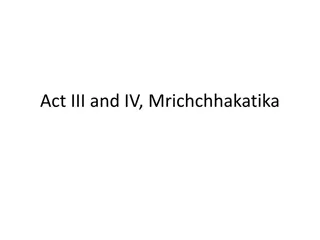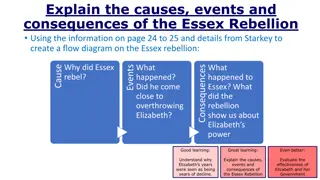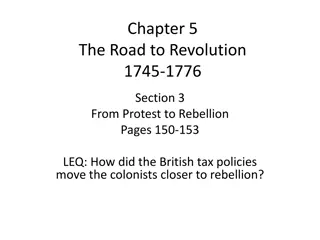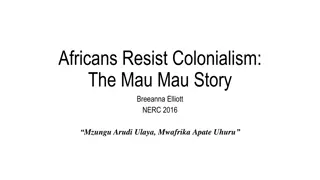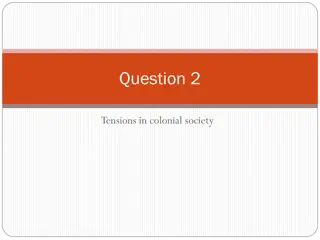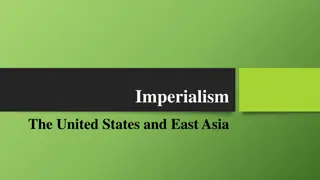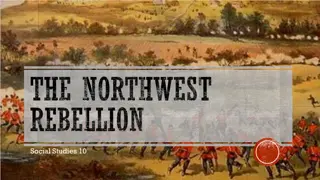
Boxer Rebellion 1900: Causes, Consequences, and The Eight-Nation Alliance Agreement
The Boxer Rebellion of 1900 was driven by economic, ethnic, religious, and opium-related issues, leading to atrocities committed by foreign troops against Chinese civilians. The Eight-Nation Alliance imposed war reparations on China, with significant historical implications.
Download Presentation

Please find below an Image/Link to download the presentation.
The content on the website is provided AS IS for your information and personal use only. It may not be sold, licensed, or shared on other websites without obtaining consent from the author. If you encounter any issues during the download, it is possible that the publisher has removed the file from their server.
You are allowed to download the files provided on this website for personal or commercial use, subject to the condition that they are used lawfully. All files are the property of their respective owners.
The content on the website is provided AS IS for your information and personal use only. It may not be sold, licensed, or shared on other websites without obtaining consent from the author.
E N D
Presentation Transcript
Boxer Rebellion-1900 WH 19c
Economic advantage Ethnic and cultural differences Religion Opium Issues
Britain, United States, Australian colonial, British India, Germany, France, Russia, Italy, Japan The eight nations
One witness recalled that "[t]he conduct of the Russian soldiers is atrocious, the French are not much better, and the Japanese are looting and burning without mercy." It was reported that Japanese troops were astonished by other Alliance troops raping civilians. Roger Keyes, who commanded the British destroyer Fame and accompanied the Gaselee Expedition, noted that the Japanese had brought their own "regimental wives" (prostitutes) to the front to keep their soldiers from raping Chinese civilians. Thousands of Chinese women committed suicide; The Daily Telegraph journalist E. J. Dillon stated it was to avoid rape by Alliance forces, and he witnessed the mutilated corpses of Chinese women who were raped and killed by the Alliance troops.
On 7 September 1901, the Qing court agreed to sign the "Boxer Protocol" also known as Peace Agreement between the Eight-Nation Alliance and China. The protocol ordered the execution of 10 high- ranking officials linked to the outbreak and other officials who were found guilty for the slaughter of foreigners in China. Alfons Mumm (Freiherr von Schwarzenstein), Ernest Satow and Komura Jutaro signed on behalf of Germany, Britain and Japan respectively. China was fined war reparations of 450,000,000 taels of fine silver (~540,000,000 troy ounces (17,000 t) @ 1.2 ozt/tael) for the loss that it caused. The reparation was to be paid within 39 years, and would be 982,238,150 taels with interest (4 percent per year) included. To help meet the payment it was agreed to increase the existing tariff from an actual 3.18 percent to 5 percent, and to tax hitherto duty-free merchandise. The sum of reparation was estimated by the Chinese population (roughly 450 million in 1900), to let each Chinese pay one tael. Chinese custom income and salt tax were enlisted as guarantee of the reparation. China paid 668,661,220 taels of silver from 1901 to 1939, equivalent in 2010 to ~US$61 billion on a purchasing power parity basis.
The missionaries were the most condemned. Mark Twain reflected American outrage against looting and imperialism in his essay, "To the Person Sitting in Darkness".American Board Missionary Ament was his target. To provide restitution to missionaries and Chinese Christian families whose property had been destroyed, Ament guided American troops through villages to punish Boxers and confiscate their property. When Mark Twain read of this expedition, he wrote a scathing attack on the "Reverend bandits of the American Board." Ament was one of the most respected and courageous missionaries in China and the controversy between him and Mark Twain was front page news during much of 1901. Ament's counterpart on the distaff side was doughty British missionary Georgina Smith who presided over a neighborhood in Beijing as judge and jury.
The China Inland Mission lost more members than any other missionary agency: 58 adults and 21 children were killed. However, in 1901, when the allied nations were demanding compensation from the Chinese government, Hudson Taylor refused to accept payment for loss of property or life in order to demonstrate the meekness and gentleness of Christ to the Chinese.


